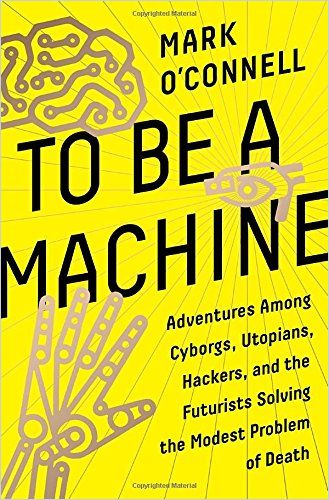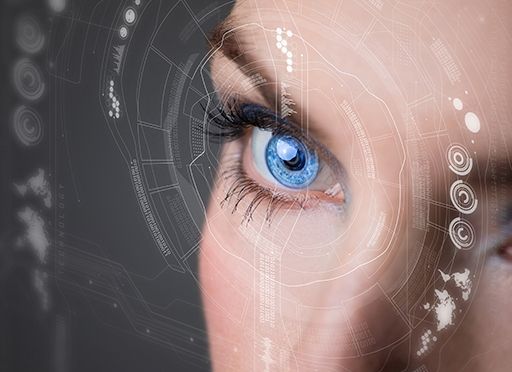Slate columnist Mark O’Connell describes, debunks and contextualizes transhumanism – the mind-set that humans can merge with machines.

To Serve Humankind
Slate book columnist Mark O’Connell discusses life extension, body modification, cyborgs and uploading the human mind into machines while arguing that science fiction is becoming increasingly less fantastic. O’Connell cites “transhumanism” as movements that reject limits on human minds, bodies and lives. What he finds is compelling, sometimes sad and often surprising.
O’Connell has fun with his discoveries and the language he uses to describe them. Appropriately, The New York Times Book Review – which named this an Editor’s Choice – said, “This gonzo-journalistic exploration of the Silicon Valley techno-utopians’ pursuit of escaping mortality is a breezy romp full of colorful characters.” Machine was a finalist for the Royal Society Investment Science Book Prize; shortlisted for the Baillie-Gifford Prize for Non-Fiction; and won the Wellcome Book Prize. NPR.org called it, “Wryly humorous, cogently insightful.”
Transhumanism
O’Connell frames the transhumanist movement as refusing to accept life’s limits and rejecting death. Transhumanism posits, he reveals, that people should embrace technology to improve human minds and bodies, extend lives, and blend human consciousness with technology.
A broad definition of ‘transhumanism’ is a liberation movement advocating nothing less than a total emancipation from biology itself.Mark O’Connell
To improve the human mind, O’Connell cites transhumanists as embracing education, drugs, technology and genetic manipulation. They regard the mind as obsolete technology in need of upgrades. Transhumanists are, the author underscores, almost all men.
Cryogenics
O’Connell investigates cryonic suspension – people storing their bodies or head until science can cure whatever killed them.
[Cryonics organization] Alcor’s mission is presented as a humanitarian one: Like any business, they want to expand their customer base, but this objective also happens to be theoretically aligned with the overall aim of defeating death.Mark O’Connell
O’Connell makes clear that no scientific basis exists for believing that anyone’s cryostored dead head or body will ever live again.
O’Connell discusses people who want to create technological bodies humans can control with uploaded minds; these people vest in the metaphor of the human mind as software.
We are talking about not just radically extended life spans – but also radically expanded cognitive abilities.Mark O’Connell
O’Connell quotes critics who argue that these ideas are simplistic and treat the mind as mere data, when it is a complex system – such as a school of fish.
Technological Singularity
O’Connell discovered that the notion of technological singularity permeates Silicon Valley culture and its supporters claim it will generate infinite riches and good.
The animal life is over now. The machine life has begun.Mark O’Connell
O’Connell cites how Elon Musk, Stephen Hawking, Peter Thiel and Bill Gates expressed misgivings about the negative implications of artificial intelligence; some think AI poses an existential risk parallel to nuclear war and more immediately threatening than climate change. The singularity, O’Connell explains, refers to when AI surpasses human intelligence. AI, O’Connell explains, would process information much faster than humans and either be indifferent to humanity or regard humanity as standing in the way of its goals. AI would be the final human invention, the author cautions, and then create on its own.
Robots
O’Connell describes with amusement how robotic designers speculate about the wonder of humans having arms with twice as many joints or bodies that could endure murderous conditions. He reminds readers that today’s robots have trouble opening doors and getting out of cars.
Cyborgs
The cyborg concept, O’Connell recounts, attempts to tinker with humanity as if it were a machine. He cites the military wanting to remove limits that soldiers face and increase their mental and physical capacities.
The American government has, unsurprisingly, shown a long-standing interest in the idea of merging humans with machinery for military purposes.Mark O’Connell
O’Connell finds this mind-set quite American and, in its way, logical – to engage in continual self-improvement, one must move past all limits. He offers a perceptive observation: Transhumanism parallels contemporary transgender identity issues in that transgender individuals regard their birth gender as a trap as transhumanists find their humanity entrapping.
Transhumanists, O’Connell reiterates, solve problems with technology and death is merely a problem. The envisioned solution, he finds, requires technology solving the difference between computing and biology. Computing, O’Connell shows, involves reversible processes; biology involves seemingly irreversible processes.
Death…was no longer a philosophical problem; it was a technical problem. And every technical problem admitted of a technical solution.Mark O’Connell
O’Connell finds that transhumanism and religion – both responses to human frailty and mortality – also share parallels. Both look to the moment, he clarifies, when suffering ends, the world improves, they acquire new bodies and death no longer exists. Since transhumanism claims transcendence without sin, salvation or a deity, O’Connell cites critics who regard transhumanism as a perversion of Christianity and religion.
When?
Though O’Connell presents most of these concepts as hogwash, depending on your age, you might have two likely responses to his discoveries: If you’re young, you might excitedly imagine the possible future they suggest. If you’re not, you might think: I’ll be dead before any of this becomes functioning reality. So, your position on the age continuum might contribute to how compelling you find O’Connell’s journey into transhumanism. The author’s most engaging passages feature him venturing out of the speculative universe and presenting astute insights into the all-too-human urge to escape human nature and all its weaknesses. O’Connell might delve too deeply into these various loony schemes and you may skip certain sections to vest more deeply into his quite well-written, perceptive and compassionate observations.
Mark O’Connell’s other books include Epic Fail and Notes from an Apocalypse. Ancillary readings in the potential interface of human and machine include Life 3.0 by Max Tegmark; The Future of Man by Pierre Teilhard de Chardin; and Homo Deus by Yuval Noah Harari.





